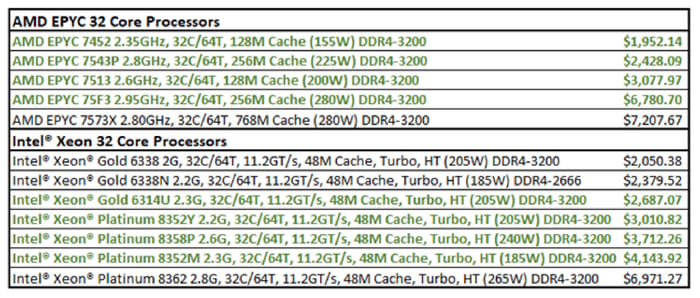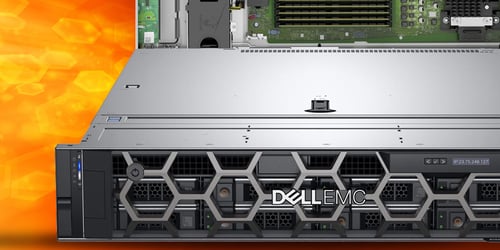The Dell EMC PowerEdge R7515 is a 1-socket, 2U server that is designed to run complex workloads using highly scalable memory, I/O ports, and network channels.
The PowerEdge R7515 system is based on the 2nd and 3rd Generation AMD EPYC SP3 processors, ranging from 16-cores up to 64-cores, with up to 16 DIMMs, PCI Express-4.0 enabled expansion slots, and a choice of network LOM Mezz Card riser technologies. The R7515 also supports either 12x 3.5-inch or 24x 2.5-inch form factor disk supporting 6Gps SATA HDD, 12Gps SAS, SSD and NVMe protocols.
The Dell PowerEdge R7515 is a general-purpose AMD based platform capable of handling demanding workloads and applications such as data centers, eCommerce, databases, virtualization (software defined, vSAN) and high-performance computing. Also, the server provides extraordinary storage capacity options, making it well-suited for data-intensive applications without sacrificing I/O performance.
Why AMD vs. Intel?
The PowerEdge R7515 is an AMD based platform, so when it comes to choosing AMD vs. Intel in the single-socket server category it really comes down to workloads. While Intel's “Ice Lake” Xeon SP server processors are a big improvement over their predecessors, they do not even come close to matching the EPYC 7003 series processors when it comes to single-core or total socket throughput performance. When it comes to price/performance and compatibility with existing server designs, AMD is winning this matchup against Intel in data center compute – hands down. This has been a key factor in processor selection for many of our customers.
For example, virtualization, the 32-core market is important because VMware vSphere is licensed with packs of 32-cores per socket.
Table 1 shows the price comparison from Dell.com between the available 32-core processors for both Intel and AMD. Making the right decision for specific Virtual Machines (VMs) workloads can affect the acquisition cost quite drastically. AMD edges out Intel on price/performance also for midrange processors. The AMD 7543P vs. the Intel 6314U, two very popular processors in the 32-core tier, is a good comparison example.

Intel Xeon Gold 6314U vs. AMD EPYC 7543P Performance
When AMD has the ability to exercise its caches and higher clock speeds it does well. For its part, Intel is focusing on its performance story over AMD and has some focus on workloads that do not work as well in AMD's heavily cache-centric architecture. Performance testing has been done specifically on the 32-core single-socket server, going head-to-head with the AMD EPYC 7543P is the Intel Gold 6314U within the same price range (see Table 1). Remember this is important because of VMware licensing.
The SPECrate2017_int_base numbers were in line with industry expectations. Specifically, the SPEC CPU 2017 numbers since that is a metric that is often used in server RFPs. Server vendors such as Dell have teams optimizing platforms and submit results to SPEC.org for inclusion as official results on their sites. The implications are huge. Higher numbers mean a vendor can be included in RFP processes, so vendors spend a lot of resources to get the best figures possible.
SPEC CPU 2017 focuses on compute intensive performance, which means these benchmarks emphasize the performance of:
- Processor: The CPU chip(s)
- Memory: The memory hierarchy, including caches and main memory
- Compilers: , C++, and Fortran compilers, including optimizers
SPEC CPU 2017 intentionally depends on all three of the above - not just the processor. Let's see if the findings aligned with the industry standard


Looking at the number in Tables 1 and 2 for both Integer and Floating Point Rates the SPECrate2017_int_base of 277 for the EPYC 7543P and 220 for the Intel Xeon Gold 6314U, AMD is 26% higher figure over Intel. The SPECrate2017_fp_base of 266 for the EPYC 7543P and 201 for the Intel Xeon Gold 6314U is just over 32% higher for AMD versus Intel.
When looking at the OEM numbers, which are official numbers used in the industry to make purchasing decisions, the AMD EPYC 7543P tends to be ahead of the Intel Xeon Gold 6314U by 25-33%. Closer to a 22% uplift on the unofficial result, this, at minimum, was a third-party validation of the AMD vs. Intel selection. AMD processors generally perform better according to the testing of single-socket 32-core processors.
Conclusion
It is probably obvious by now, but one of the major driving factors for comparing the Intel Xeon Gold 6314U vs. the AMD 7543P review was to see the importance of platform selection when it comes to AMD vs. Intel in the single-socket server market. The 6314U helps Intel to be much more competitive in this space against AMD. Overall, Intel made a lot of headway in this generation with Ice Lake processors.
At list pricing, when considering the PowerEdge R7515 we would probably recommend many of our customers look at the AMD EPYC 7543P over the Intel Xeon Gold 6314U. AMD has more performance with the same core count, thus more performance per core. In other segments, having an AMD EPYC platform means more PCIe Gen4 connectivity. Still, there are many single-socket servers that have 0-1 expansion cards and 1-4 drives where Intel is now very competitive.

